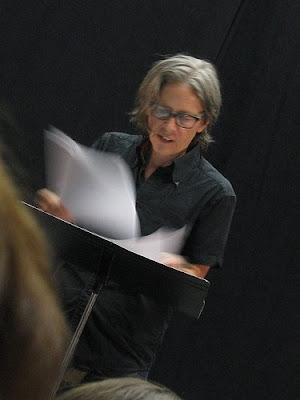Now reading: The Eighth Day by Dianne K. Salerni
Yesterday I was looking forward to reading my book after work. I’d missed out on my usual bus reading time, because on Tuesday I drove to work for the first time since I started my job in 2008, so that Sang and I could go to the suburban Powell’s in the evening and see Atul Gawande. And yesterday we drove across town for breakfast with Sang’s parents, who were on their way home from a reunion, and then parked on campus again. Such decadence. Actually, driving to work was completely tedious, even with the radio. I am relieved that I’d actually much rather ride the bus (since it’s way cheaper and greener).
But yesterday I walked through the pouring rain to the Stott Center before six p.m. to get seats for Sang and me for Winona LaDuke’s talk at seven. Sang was tutoring until 6:45, so it was just me and my book and my notebook on our two little white plastic folding chairs.
The Eighth Day is about a boy who turns twelve and suddenly starts experiencing a day between Wednesday and Thursday. No one else is there, the first time this happens. AWESOME, right? I love extra-time tropes! Except, they are always ruined. Nicholson Baker’s Fermata, so icky. I remember liking Jane Louise Curry’s Parsley Sage, Rosemary, and Time, but it turns out it’s a time travel book. Where is the book about a character stopping time and catching up on studying, getting a little extra rest and tidying up the house? It’s like that wouldn’t make a good story or something, sheesh.
Anyway, this one turns into an Arthurian thing, with descendants of Merlin and the Pendragon and others in various factions, and for some reason it’s a bit of a trudge. It felt weird to be reading a Merlin story in a hall full of Indigenous Studies and Sustainability people. I overheard greetings in Chinuk Wawa nearby!
I’m glad I went to hear Winona LaDuke. I look up to her for finding a way to live as an activist and a leader without giving up on doing the cool stuff that’s important to her, her way. Growing corn and teaching the kids at her grandkids’ school how to braid it, and also running for vice president. Last year she and other Anishinaabe and Lakota riders traced the routes of three proposed oil pipelines, on horseback. Sometimes I feel like being an activist consists of going to a lot more meetings, ugh, and it’s good to see that it can be much more. Sang said on the way home that she’d been worried it would be like two hours of listening to Mo from Dykes to Watch Out For… but it wasn’t at all.
Celebrity dinner party: Winona LaDuke, Eileen Myles, Sarah Schulman.
 (This photo was taken by Tom Orange in 2008, but it’s very much what she looked like.)
(This photo was taken by Tom Orange in 2008, but it’s very much what she looked like.)